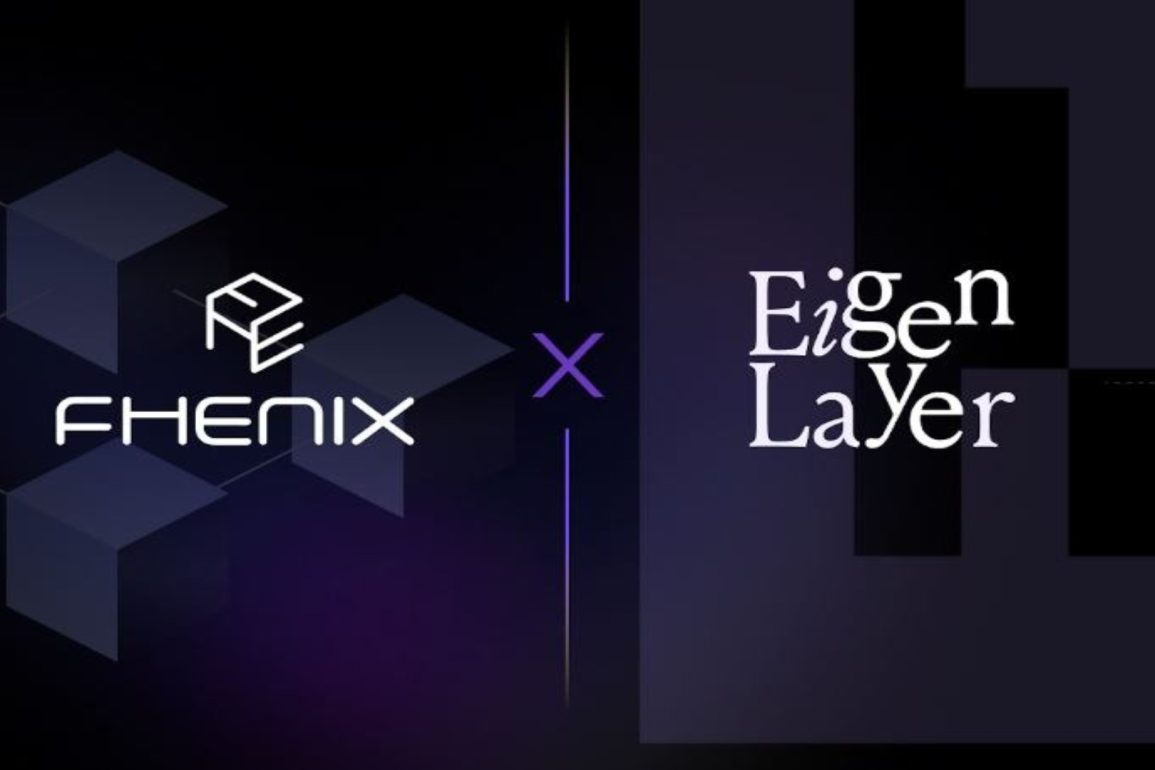Fhenix, the first Ethereum L2 platform powered by fully homomorphic encryption (FHE), has announced the development of FHE-based coprocessors in collaboration with EigenLayer. With this engineering partnership, both projects will dedicate significant resources and incorporate the build into their technical roadmaps this year.
FHE coprocessors are secured by Fhenix’s optimistic FHE rollup infrastructure, and EigenLayer’s restaking mechanism.
These FHE coprocessors are designed to delegate computational tasks that require handling sensitive (i.e., encrypted) data, away from a host chain—be it Ethereum, a L2, or a L3—to a designated processor. This greatly improves the efficiency of FHE based operations, while maintaining the same level of security, unlocking the ability to compute over encrypted data at performance levels previously considered impossible.
Fhenix CEO, Guy Itzhaki: “FHE coprocessors represent a significant leap forward when it comes to scaling on-chain FHE. Once considered impossible, FHE coprocessors solve the challenge of analyzing large data sets on Ethereum without compromising on-chain performance. It basically provides a more efficient way to process encrypted data without revealing its contents. With sensitive data not at risk of being exposed, developers are free to create powerful applications for industries ranging from fintech to gaming.”
What is a Coprocessor?
A coprocessor serves as a companion processor designed to offload specific computational tasks from a host chain, be it Ethereum, an L2, or an L3, to a designated processor living outside the scope of the host. For example, ZK coprocessors are the industry’s primary means of scaling ZK rollup computations off-chain.
In contrast to ZK coprocessors, FHE coprocessors focus on computing over encrypted data (without decrypting), which opens up new applications that would otherwise not be possible.
FHE Coprocessor Architecture
FHE coprocessors, powered by lightweight rollups, get inputs directly from the host chain (or from a user calling the coprocessor directly) rather than storing a state by themselves. This makes the coprocessor a more lightweight construction that can remain idle until it is needed to perform specific tasks. Furthermore, being stateless, it can greatly optimize the performance of these computations by using leveled FHE schemes.
Fhenix Founder, Guy Zyskind – “Blockchains need more sophisticated cryptography (FHE) to allow applications to utilize sensitive data, and thanks to FHE coprocessors, what was once deemed impossible is now not only feasible but also extremely scalable. Confidential computing will grow at scale, and the ability to provide immediate confirmations would not be otherwise possible without our joint efforts with EigenLayer.”
For efficiency reasons, FHE rollups rely on fraud proofs (as opposed to ZK proofs). These proofs are settled on the host chain directly, which ensures both the host chain and coprocessor share security.

Fast-tracking transactions with EigenLayer
EigenLayer enables any AVS to inherit security for objectively attributable faults from Ethereum. The FHE coprocessor uses a restaked rollup paradigm to get a cryptoeconomic guarantee on the correctness of the execution made by the FHE rollup. EigenLayer operators certify the correctness of the execution done by the FHE rollup. If these operators are malicious by committing to the correctness of a wrong execution then the stake of these operators is slashed. This cryptoeconomic guarantee removes the necessity for waiting until the end of the fraud-proof period (typically seven days), thus resolving the interoperability tradeoff.
Why This Partnership Matters
By eliminating this dispute period entirely, Fhenix’s FHE coprocessors can provide immediate confirmation for fraud proofs and compute at performance levels previously considered impossible, marking a major milestone in the advancement of scaling on-chain FHE.
EigenLayer Founder, Sreeram Kannan said: “It’s exciting to see the use cases for EigenLayer’s expansion through Fhenix’s integration of FHE-based coprocessors. As the multi-chain ecosystem grows, the need for on-chain data that is verifiable and confidential is more important than ever. With EigenLayer operators providing the necessary fraud proofs, developers that utilize Fhenix are free to build powerful applications on a bedrock of secure and computationally efficient data.”
The application spectrum for FHE coprocessors is vast and includes areas where confidentiality is paramount.
Take, for instance, the application of FHE in on-chain sealed-bid auctions, bids remain confidential until the auction concludes, ensuring fairness and integrity. Similarly, in private AI scenarios, sensitive inputs, such as personal financial information, can be analyzed without exposing them. Other applications include using FHE coprocessors to build cross-chain smart wallets, by signing with an encrypted private key not known to anyone, or privately manipulating a game’s shared state, where the confidentiality of the players’ strategies is preserved (think of poker as an illustrative example).
By harnessing the power of FHE coprocessors, any use case involving potentially sensitive information can now have FHE built-in from the ground up, unlocking a wide range of new possibilities for blockchain applications.
About Fhenix
Fhenix is the first FHE-powered L2 to bring on-chain confidentiality to Ethereum. Fully Homomorphic Encryption, or FHE, is a novel cryptographic scheme that enables direct computation over encrypted data without ever revealing the underlying data. Fhenix extends Ethereum’s capabilities with the goal of advancing application development and bringing true data confidentiality to smart contracts, transactions, and on-chain assets for the first time.
About EigenLayer
EigenLayer is a protocol built on Ethereum that introduces restaking, a new primitive in cryptoeconomic security. Restaking enables staked ETH to be used as cryptoeconomic security for protocols other than Ethereum, in exchange for protocol fees and rewards.


